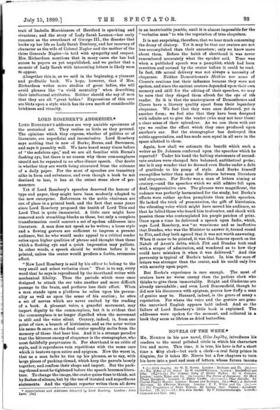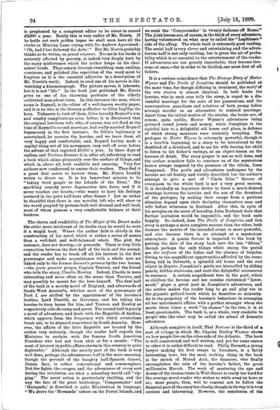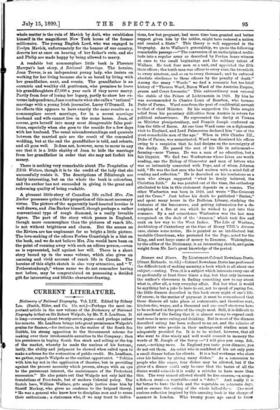NOVELS OF THE WEEK.*
MR. NORRIS in his new novel, Giles Ingilby, introduces his readers to the usual polished circle in which his characters live and move. This time, it is true, his hero is for' a shott time a Gity clerk—but such a clerk—a real fairy prince in disguise, for it takes Mr. Norris but a few chapters to turn his hero into a poet and man of letters, whose future income • (1.) Geis Ingilby. Br W. E. Norris. London : Methuen and Co. [6s.]— ) The MO* of the Desert. By W. SmIttrWilliams. London : Blactral>od and Schis. (611.,)---1—(3.) The Strange Story of Hester IVI/hne. By 0. Coimore. London : Smith, Elder, and Co. [6s.)—(4.) The l'crils of Josephine. By Hord ENest Hamilton. London : T. Fisher tim.fin. [6s.)--(6.) That Fortiene. By Charles fhhilev Warner. London : }Loper and Brothers. (6s.)-4‘46.) A Rational Marriage. BY Fibrenee Mtrryat. London : F. V. White and Co. [6s.]- (7.) The Temptation of Edith Watson. Bk Sydney Hall. Paisley : Alexander Gardner. [A. 6,1.]—(8.) Mrs. Jim Barker. By V. Fetherstonhangb. Londdh Chapman and Hall.
is prophesied by a competent editor to be about to exceed £6,000 a year. Really this is very unfair of Mr. Norris. If he holds out such golden hopes we shall soon have all the clerks in Mincing Lane crying with Sir Andrew Aguecheek : "Oh, had I bat followed the Arts ! " But Mr. Norris probably thinks as he writes, en grand seigneur. No one in his books is seriously affected by poverty, or indeed very deeply hurt by the many misfortunes which the author heaps on his char- acters' heads. They remain through everything easy, smiling, courteous, and polished (the repetition of the word must be forgiven as it is the essential adjective in a description of Mr. Norris's work). Indeed, to read one of his novels is like watching a kinematograph. The picture moves, it interests, but it is not "life." In the book just published Mr. Norris gives us one of his charming portraits of the elderly cultivated man-abont-town. In thie instance the man, whose name is Reynell, is the editor of a well-known weekly paper, and it is he who is the literary godfather to Giles Ingilby, the hero. Unknown to both of them, Giles is really Reynell's son, and sundry complications arise before it is discovered that the original low-born wife, who, of course, was not dead at the time of Reynell's second marriage, had really married Reynell bigamously in the first instance. So Giles's legitimacy is ascertained, he marries the heroine, and we leave them all very happy and comfortable, and, Reynell having made a capital thing out of his newapaner, very well off even before the advent of that expected £6,000 a year. In these days of realism and Tendenz-Romanz it is, after all, refreshing to read a book which skims pleasantly over the surface of things, and which is, above all, both readable and amusing. Very few authors now condescend to amuse their readers. They find it a great deal easier to harrow them. Mr. Norris frankly writes to divert us. It is his benevolent mission to be "taking tired people to the Islands of the Blest." His sparkling comedy never degenerates into farce, and if it never touches our hearts,—who wants to have his feelings tortured in the quiet half-hour after dinner ? Let us rather he thankful that there is one novelist left who will show us the world peopled by persons both well dressed and well bred, most of whom possess a very comfortable balance at their bankers.
The charm and readability of The Magic of the Desert make the critic more intolerant of its faults than he would be were it a stupid book. Where the author fails is chiefly in the construction of his novel, which is rather a series of scenes than a well-knit and well-balanced whole. The plot, for instance, does not develop,—it proceeds. There is very little connection between the first half of the book and the second, and the reader has to break off all his interest in the first personages and make acquaintance with a whole new set linked only to the former dramatis personz by the two heroes, —the jeans premier proper, Captain Travers, and the friend who tells the story, Charlie Rowley. Indeed, Charlie is more interesting and more often on the scene than Travers, and may possibly be meant for the hero himself. The first half of the book is a society novel of England, and afterwards of South-West Australia, whither most of the personages of Part I. are shifted by the appointment of the heroine's brother, Lord Penrith, as Governor, and his taking the heroine to keep house for him. and Travers and Rowley as respectively aide-de-camp and guest. The second half is purely a novel of adventure, and deals with the Republic of Andina, which appears, from the frequency with which revolutions break out, to be situated somewhere in South America. How- ever, the affairs of the little Republic are treated by the author very seriously, though the reader half expects the Ministers to exclaim with the famous South American President who bad not been shot at for a month : "The want of interest in public affairs shown in this country is quite deplorable." Although the society part of the book is very well done, perhaps the adventurous half is the more amusing, though the portrait of the haughty half.Spanish damsel, Donna Inez, is rather conventional and commonplace. But the fights, the escapes, and the adventures of every sort during the revolution are what a schoolboy would call "rip- ping." The naval action is particularly thrilling, and the way the fate of the great battleships, Conquestador ' and 'Hernando,' is described is quite Elizabethan in language. "We drove the 'Hernando' ashore on the Ferrol Islands, and we sunk the Conquestador ' in twenty fathoms off Rosaa." The joint heroes are, of course, in the thick of every adventure, having volunteered on what may be called the "Legitimate" side of the affray. The whole book is extremely good reading. The social half is very clever and entertaining, and the adven- turous half is not only exciting, but is given the air of proba- bility which is so essential to the entertainment of the reader. If adventures are too grossly improbable, they become tire- some at once,—for in order to be thrilled, one must first of all believe.
It is a curious coincidence that The Strange Story of Hester Wynne and The Perils of Josephine should be published at the same time, for though differing in treatment, the motif of the two stories is almost identical. In both books the heroine, who in each case tells the story, is urged to a dis- tasteful marriage for the sake of her possessions, and the unscrupulous guardians and relatives of both young ladies attempt murder as an alternative to resisted marriage. Apart from the initial motive of the stories, the books are, of course, quite unlike, Hester Wynne's adventures being grouped round jewels and money, while Josephine is the rightful heir to a delightful old house and place, in defence of which strong measures were certainly tempting. The prologue to Hester Wynne is extremely powerful, though it is a terrible beginning to a story to be introduced to the deathbed of a drunkard, and to see his wife forcing her child to listen to his father's ravings, as an object-lesson on the horrors of drink. The story proper is not so well done, and the author somehow fails to convince us of the mysterious horror always inspired by the presence of the villain, Jesse Pimpernel. The perils and adventures undergone by the heroine are all freshly and vividly described, but the author's attempt to give a sort of " Uncle Silas" flavour of creepiness to the whole book is not a very great success. It is decidedly an ingenious device to force a ranch-desired marriage between the heroine and the son of the drunkard of the prologue, by making their escape from a perilous situation depend upon their declaring themselves man and wife before witnesses in Scotland. After this, in spite of his scruples on the score of heredity, John Brabrook feels that further hesitation would be impossible, and the book ends happily. So, indeed, does The Perils of Josephine, and this story is perhaps a more complete success than the other, both because the motive of the intended crime is more powerful, and also because there is no attempt at a mysterious atmosphere. A quaint flavour is imparted to the book by putting the date of the story back into the late "fifties," though perhaps the only things which stamp the period are the coiffures of the ladies and the absence of bicycles. Owing to the magnificent opportunities afforded by the scene being laid in Selworth, a splendid old house and the real object in dispute. Josephine's perils are intensified by sliding panels, hidden staircases, and such-like delightful accessories to romance. A certain magnificent tree in the park, which as children the heroine and her cousins christened "Incur.
plays a great part in Josephine's adventures, and the author makes the reader long to go and play too in the gigantic pollard-beech which he describes so minutely. As to the propriety of the heroine's behaviour in arranging all her matrimonial affairs with a perfect stranger whom she meets three times a week "by chance" in the tree, it is at least questionable. The book is, as a whole, very readable to people who like what may be called the school of domestic adventure.
Although complete in itself, That Fortune is the third of a sort of trilogy in which Mr. Charles Dudley Warner shows us how people live on the other side of the Atlantic. The book is well constructed and well written, and yet for some reason or other it is rather difficult to read. Philip Burnett, a young lawyer making his first essays in literature, is a fairly interesting hero, but the most striking thing in the book is the sketch of Murad Ault, the financier, who finally accomplishes the ruin of the heroine's father, the great millionaire Ma.vick. The work of mastering the ups and downs of the transactions in Wall Street is really too hard for the average novel-reader who wishes to while away an hour or so; most people, then, will be content not to follow the financial part of the story too closely, though in its way it is very curious and interesting. However, the conclusion of the
whole matter is the ruin of Mavick by Ault, who establishes himself in the magnificent New York house of the former millionaire. The young English Lord, who was engaged to Evelyn Mavick, unfortunately for the honour of our country, deserts her at once on hearing of her father's ruin, and she and Philip are made happy by being allowed to marry.
A readable but commonplace little book is Florence Marryat's last story, A Rational Marriage. The heroine, Joan Trevor, is an independent young lady, who insists on working for her living because she is so bored by living with her grandfather, aunt, and cousin. The grandfather is an eccentric and wealthy old gentleman, who promises to leave his granddaughters 27,000 a year each if they never marry. Partly from fear of losing her legacy, partly to show her ex- treme independence, Joan contracts what she calls a "rational" marriage with a young Irish journalist, Larry O'Donnell. In its effects this appears to have exactly the same results as a commonplace secret marriage, for in a secret marriage husband and wife cannot live in the same house. Joan, of course, gets herself into many moat disagreeable false posi- tions, especially when she goes to the seaside for a few days with her husband. The usual misunderstandings and quarrels between the married pair are the result of the concealed wedding, but at the end the grandfather is told, and relents, and all goes well. It does not, however, seem to occur to any one that it is a little shabby of Joan to hide the marriage from her grandfather in order that she may not forfeit his money.
There is nothing very remarkable about 27se Temptation of Edith Watson, though it is to the credit of the lady that she successfully resists it. The descriptions of Edinburgh are fairly interesting, but on the whole the book is colourless, and the author has not succeeded in giving it the great and redeeming quality of being readable.
A pleasant little story of Canadian life called Mrs. Jim Barker possesses quite a fair proportion of this most necessary virtue. The picture of the apparently hard-hearted heroine is well drawn, and Jim Barker himself, though perhaps a rather conventional type of rough diamond, is a really loveable figure. The part of the story which passes in England, though more commonplace than the pictures of ranch life. is not without brightness and charm. But the scenes on the Riviera are too unpleasant for so bright a little picture. The love-making of the odious Forbes Grantleigh is a blot on the book, and we do not believe Mrs. Jim would have been on the point of running away with such an odious person,—even as is represented, half against her will. There is a short story bound up in the same volume, which also gives an amusing and vivid account of ranch life in Canada. The heroine of this slight sketch is also very attractive, and "V. Fetherstonhangh," whose name we do not remember having met before, may be congratulated on possessing a decided gift for interesting and lifelike character-drawing.








































 Previous page
Previous page